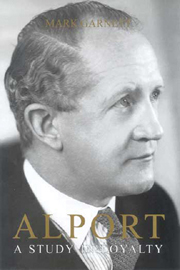Book contents
- Frontmatter
- Contents
- Acknowledgements
- Foreword
- Introduction
- 1 Father and Son
- 2 A National Faith
- 3 “Love and War”
- 4 Reviving Conservatism
- 5 “One Nation”
- 6 Early Postings
- 7 “Political Suicide”
- 8 “More Trouble with the Government, Daddy?”
- 9 A Freelance Diplomat
- 10 Gains and Losses
- Notes
- Bibliography
- Index
- Plate section
7 - “Political Suicide”
- Frontmatter
- Contents
- Acknowledgements
- Foreword
- Introduction
- 1 Father and Son
- 2 A National Faith
- 3 “Love and War”
- 4 Reviving Conservatism
- 5 “One Nation”
- 6 Early Postings
- 7 “Political Suicide”
- 8 “More Trouble with the Government, Daddy?”
- 9 A Freelance Diplomat
- 10 Gains and Losses
- Notes
- Bibliography
- Index
- Plate section
Summary
The government reshuffle after the 1959 general election provided an opportunity for the original members of the “One Nation” group to take stock of their careers. They had been in the House for almost a decade, and with younger Conservatives now filling up the back-benches this Parliament would decide whether or not their early promise would be translated into solid achievement.
From the founding nine, Richard Fort was already dead, the victim of a car accident before the 1959 election. Gilbert Longden and John Rodgers, who had entered the Commons comparatively late, were still on the back-benches. Both Powell and Maude had interrupted their careers with acts of rebellion; Powell would return as a cabinet minister under Macmillan, but Maude only got back into Parliament in 1963. They were already well known for being too brilliant to ignore – or to trust. Having served as Eden's PPS in 1955, Robert Carr was working his way through junior offices; the youngest of the original group, he still had a good chance of higher honours. Cub had every reason to be satisfied with his own progress; after the election he was promoted to Minister of State, the first time anyone at the CRO had held that rank. But Ted Heath and Iain Macleod had prospered the most. Having done so much to hold the party together as Chief Whip, Heath succeeded Macleod at the Ministry of Labour after the election. Both men were already being spoken of as possible future leaders of the party.
- Type
- Chapter
- Information
- AlportA Study in Loyalty, pp. 143 - 174Publisher: Acumen PublishingPrint publication year: 1999



